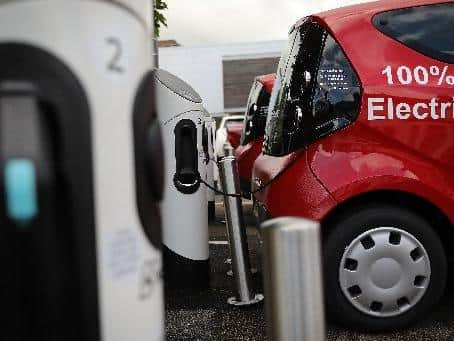Rother Valley MP Alex Stafford says failing to secure the critical minerals needed for electric cars could cost 500,000 jobs by 2030
Rother Valley MP Alex Stafford says the Government "must take immediate and assertive action" to avert the "potential disaster" of the batteries and motors of electric cars not being made in the UK because of a lack of minerals such as copper, lithium and cobalt.
And with much of the world's supply of 'critical minerals' dominated by China he told the Commons that bringing as much of the supply chain as possible to the UK was vital to "safeguard the future prosperity of the United Kingdom and the west in the spheres of the economy, defence and energy".


Advertisement
Hide AdAdvertisement
Hide AdMr Stafford, one of the 2019 'blue wall' intake of Conservative MPs in Yorkshire, led an adjournment debate on the minerals which are vital for low-carbon industrial capabilities but which face supply chain vulnerability.
He told MPs that awareness of where critical minerals come from and what they are used for is low and that "the Government are waking up to the fact that the race for critical minerals security is the new great game".
Mr Stafford added: "It is vital that this House is made aware of the significant threat to our economy and our post-covid and post-Brexit recovery if we run out of the critical minerals needed to supply our low-carbon industries of the future.
"The UK’s 10-point economic plan makes an assumption that the international supply of these minerals is sufficient to service every country’s needs in our global race to avoid climate change. I would like to inform the House that that is clearly not the case."
Advertisement
Hide AdAdvertisement
Hide AdAs an example he said ultra-modern smartphones, "boasting touchscreens, cameras and 5G, use a huge number of critical minerals, including potassium, tin, copper, tungsten and advanced aluminium".
And he said that to meet the Prime Minister's objective of having every home in the UK powered by wind turbines by 2030, meaning a turbine has to be built on average every day, more than 26,000 tonnes of rare earths and more than four tonnes of copper would be needed.
Mr Stafford said the biggest threat to the country's supplies of critical minerals was the dominance of China - which refines 65 per cent of the world's cobalt and 97 per cent of the world's manganese - in the supply chain.
He said that by 2030 the world’s demand for lithium will mean that global production is 1.4 million tonnes a year in deficit, while graphite will be 8 million tonnes in deficit, cobalt 800,000 tonnes in deficit and nickel 400,000 tonnes in deficit.
Advertisement
Hide AdAdvertisement
Hide AdAnd he added: "If China controls the midstream of those minerals, and is building over three times more gigafactories than the rest of the world put together, it is only logical that China will serve its industrial requirements before the rest of the world, and before the United Kingdom."
Highlighting the "stark" consequences of this in the automotive sector, he said that some 70 per cent of the value of an electric car comes from its battery and motor.
He said: "If those components cannot be manufactured in the UK because we do not have the minerals coming into the country, the consequences for the automotive sector alone are bleak: it could cost up to 500,000 jobs by 2030.
"There is no doubt in my mind that the Government must take immediate and assertive action to avert this potential disaster, which may strike just as we set out our post-covid-19 recovery."
Advertisement
Hide AdAdvertisement
Hide AdAnd he said that for British industry to thrive post-Brexit and post-Covid "factories and plants in the Rother Valley region must stay at the cutting edge of their sector, with the best equipment and secure, efficient supply chains, thus staying competitive and retaining their reputation for the highest-quality products".
He called on the Government to support the creation of more upstream mining capability throughout the UK and more way of refining the materials for use to reduce reliance on China.